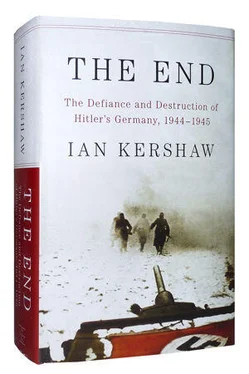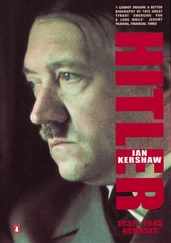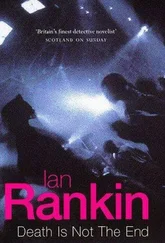As I was feeling my way into the project, I benefited enormously, as always, from lengthy discussions with long-standing German friends, Professor Hans Mommsen (Feldafing), Professor Norbert Frei (Jena), Dr Hermann Graml and Dr Elke Fröhlich (Munich), all of whom helped me greatly in shaping my ideas. I am most grateful to each of them.
Two scholars and friends I want to thank especially. Dr Jürgen Förster, a fine historian and notable expert on the Wehrmacht at the Bundesarchiv/Militärarchiv in Freiburg, answered numerous queries, directed me to important records, and, not least, read and commented on the completed typescript. Dr Nick Stargardt, Magdalen College, Oxford, who is currently working on what will be an important study of German society during the war, has been full of penetrating insights throughout. He also took the time and trouble to read the entire typescript and make numerous valuable suggestions. I am most grateful to both. Of course it needs to be added, as always, that responsibility for any remaining errors is my own.
An important debt of gratitude for their valuable suggestions on the typescript is also owing to splendid editors at Penguin—Simon Winder in London, and Laura Stickney in New York—while Andrew Wylie has been, as before, a wonderfully supportive agent. I would also like to thank all at Penguin who have helped to produce the book, Elizabeth Stratford for her excellent copy-editing and Cecilia Mackay for researching the photographs.
Finally, there are the personal debts of gratitude. Traude and Uli Spät have, as on so many occasions in the past, been extraordinarily generous in their hospitality during my stays in Munich, and taken a keen interest in my work over many years. Throughout this project Beverley Eaton, my long-serving secretary, has continued to provide excellent support, even now that I have left the University of Sheffield, and I am particularly grateful to her for undertaking so efficiently the laborious task of compiling the List of Works Cited. Last of all, my family remain the foundation on which all is built. My thanks and love to Betty, to David, Katie, Joe and Ella, and to Stephen, Becky, Sophie, Olivia and now Henry—the latest wonderful addition to the family roster.
Ian Kershaw
Manchester, November 2010
As disastrous defeat loomed in early 1945, Germans were sometimes heard to say they would prefer ‘an end with horror, to a horror without end’. An ‘end with horror’ was certainly what they experienced, in ways and dimensions unprecedented in history. The end brought destruction and human loss on an immense scale. Much of this could have been avoided had Germany been prepared to bow to Allied terms. The refusal to contemplate capitulation before May 1945 was, therefore, for the Reich and the Nazi regime not just destructive, but also self-destructive.
A country defeated in war almost always at some point seeks terms. Self-destruction by continuing to fight on to the last, down to almost total devastation and complete enemy occupation, is extremely rare. Yet that is what the Germans did in 1945. Why? It is tempting to give a simple answer: their leader, Hitler, persistently refused to entertain any thought of surrender, so there was no option but to fight on. But this simply poses other questions. Why were Hitler’s self-destructive orders still obeyed? What mechanisms of rule enabled him to determine Germany’s fate when it was obvious to all with eyes to see that the war was lost and the country was being utterly laid waste? How far were Germans prepared to support Hitler to the end, even though they knew he was driving the country to destruction? Were they in fact still giving him their willing backing? Or were they merely terrorized into doing so? How and why did the armed forces continue fighting and the government machine keep on functioning to the end? What alternatives did Germans, civilians and soldiers, have in the last phase of the war? These and other questions soon arise, then, from what seems at first to be a straightforward query inviting a simple answer. They can only be tackled by examining structures of rule and mentalities as the catastrophe inexorably engulfed Germany in 1944–5. That is what this book seeks to do.
I first thought of writing such a book because, to my surprise, I couldn’t think of another book which had tried to do what I had in mind. There are, of course, libraries of books about the end of the war, written from different perspectives, and widely varying in quality. There are important studies of the top Nazi leaders and, increasingly, of some of the regional chieftains, the Gauleiter. 1Biographies exist also for many of the leading military figures. 2There are literally thousands of accounts of events in the final climactic weeks of the Third Reich, both at the front and, it sometimes seems, for practically every town and village in Germany. Many local studies give graphic—often horrific—descriptions of the fate of individual townships as the unstoppable advance of the Allied and Soviet military juggernauts enveloped them. 3Memoirs of experiences at the front or in the homeland, in cities pounded by Allied bombs, or facing the ordeals of flight and homelessness, abound. Detailed, often localized, military histories or accounts of specific Wehrmacht units or major battles are also commonplace, while the battle for Berlin, in particular, has naturally been the focus of numerous works. 4The sixth volume of the German Democratic Republic’s official history of the war, produced in the 1980s, despite its obvious ideological slant, provides a valuable attempt at a comprehensive military history, not confined to events on the front. 5And more recently, the last volumes of the Federal Republic’s own outstanding official military history series offer excellent detailed studies of the Wehrmacht, often stretching far beyond operational history. 6Even so, these and other fine works on military history 7touch on only some—if important—aspects of what I thought was necessary to answer the questions I wanted to tackle.
My initial intention had been to approach the problem through exploring the structures of rule in Nazi Germany in this last phase. It seemed to me that the major structural histories of the Third Reich tended to peter out largely by late 1944, dealing quite superficially with the final months of the regime. 8This applies also to studies of the Nazi Party and its affiliates. 9It rapidly became plain to me, however, that a mere structural analysis would not be enough, and that my examination had to be extended to the mentalities—at different levels—that underpinned the continued functioning of the regime. A comprehensive study of German mentalities in the last months has not yet been attempted. 10Reconstructing them has to be done, therefore, from fragments.
I have tried to take into account the mentalities of rulers and ruled, of Nazi leaders and lowly members of the civilian population, of generals and ordinary soldiers, and on both the eastern and the western fronts. It is a wide canvas and I have to paint with a broad brush. I can, of course, present only selective examples to illustrate the spectrum of attitudes. For not least of the problems in trying to generalize about mentalities is that during its final months, and at a highly accelerated pace in its last weeks, the Nazi regime was splintering as well as shrinking. Germany was a big country and while, obviously, the extreme pressures of war afflicted all of its regions, they did not do so at the same time, or in exactly the same ways. Experiences of the civilian population in the different parts of the country and those of soldiers in different theatres of war naturally varied. I have tried to mirror the differing mentalities rather than resort to superficial generalizations.
Читать дальше












